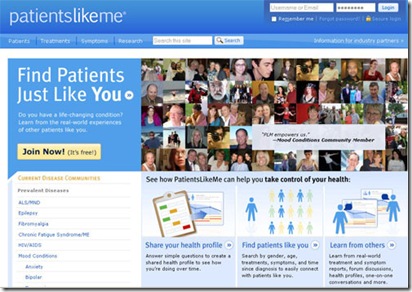Jan 05, 2011
Participatory medicine

Participatory medicine is a new trend in e-health that proposes an active role of the patient in medical care. According to the board of the Society of Participatory Medicine, this is “a movement in which networked patients shift from being mere passengers to responsible drivers of their health, and in which providers encourage and value them as full partners".
In contrast with the traditional doctor-centric curative model, participatory medicine proposes a more proactive approach, where patients not only share information about their diseases, but are also involved in treatment decisions. This new perspective recognizes that patients have a unique knowledge of their own health, which can be effectively used to improve the care process. The potential benefits of participatory medicine include enhanced patients compliance, resourcefulness and quality of life.
Online social network platforms are playing an important role to help this transition to take place. These networks allow patients who have similar diseases to connect, share knowledge and resources. They enable collaborative filtering of relevant information and apply reputation and trust management mechanisms to reduce risks of frauds and abuses. Some medical-oriented social networks also provide users with tools to track their health status. The data collected, once anonimized, can be used for research purposes, i.e. to assess patterns of drugs usage or investigate side effects.
More to explore:
PatientsLikeMe is an online platform for patients to share their experience using patient-reported outcomes, find other patients like them, and learn from the others' data to improve their outcomes. The site has gathered a huge quantity of data on its 70,000 members, which span a number of different disease communities, including epilepsy, fibromyalgia, and depression. Inspire is a US-based private company that creates and manages online patient support communities. Inspire manages more than 175 online communities, comprised of 160,000 members. Its partners include over 70 patient advocacy associations, such as the National Osteoporosis Foundation, WomenHeart, the Bladder Cancer Advocacy Network and the Ovarian Cancer National Alliance. The Society for Participatory Medicine is a 501(c)3 public charity devoted to promoting the concept of participatory medicine by and among patients, caregivers and their medical teams. The organization has launched two core initiatives, the e-patients blog and the Journal of Participatory Medicine, a peer-reviewed, open access journal that publishes multidisciplinary articles on medicine 2.0 and participatory healthcare.
Disaboom is a site for the disabled. Its main mission is to improve the way individuals with disabilities or functional limitations live their lives. The site provides several information resources for those living with disabilities, as well as their family members, friends, caregivers, and employers. The health section features articles written by medical professionals on a variety of disabilities. It was created by Glen House, a doctor who became quadriplegic after breaking his neck in a skiing accident at the age of 20. Users create profile pages and search for people with similar conditions. Diabetic Connect is the world's largest online social network for people and families living with diabete. Members can share how they feel in real-time, send virtual gifts such as flowers and hugs, and a give feedback on product reviews, recipes, diet tips, videos and other user-generated content.
IMedix is a health search engine and social network service that provides information in response to medical questions and concerns. Users enter a question — like what to do about high blood pressure — and iMedix scans articles, videos and blogs that are ranked by other users on how helpful they are. Search results are also interactive, and can be recommended by other users, or voted down in rank.
14:03 | Permalink | Comments (0)







The comments are closed.